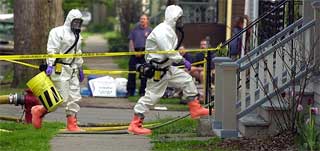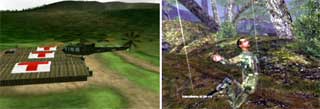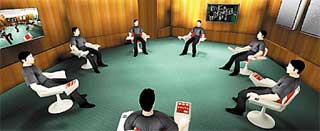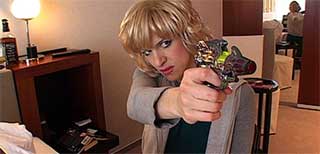The Playback_Simulated Realities exhibition is to open at the Edith Russ Haus for media art, in Oldenburg, in north-west Germany. Both the theme and the art pieces selected in the programme are very appealing.
The exhibition investigates the influence and impact re-enactments and simulations of political events and milestones of world history have on society. What changes take place when historic events are retold? The works shown in the exhibition examine in reconstructions and stagings how experiences and memories are at once individually experienced and culturally construed.
Among the works presented:

1. In her documentary feature film “Strange Culture�, Lynn Hershman alternates interviews and improv re-enactments (by Peter Coyote, Tilda Swinton and others) to relate the dramatic events which changed the life of Steve Kurtz when the FBI, after his wife died of heart failure, suspected his art activities as an act of eco-terrorism. Video extract.
2. Vietnam Romance, Eddo Stern (who worked on an other re-enactment of historical event in Waco Resurrection) investigates the influence of mass-media images on public perceptions of wars, in particular the Vietnam War.

The work is compiled from the sources available on the computer desktop environment – first-person shooters, graphics and music. A remix of the Vietnam War experience with a MIDI soundtrack, Hollywood storyboards (think M.A.S.H. and Apocalypse Now), and computer game clips.
3. Ops Room, by Felix Stephan Huber, is based on the unreal tournament 2004 engine and takes the player in the simulation of an historic place: a claustrophobic control room realized by the cyberneticists Stafford Beer and Fernando Flores in Santiago de Chile in 1972.

This room was thought to serve for the computer-operated regulation of the socialistic economy under the government of Salvador Allende. Seven identical men are set into the virtual surrounding. The player activates actions and texts which originate from Beer‘s book The Brain of the Firm. Statements like „can we shape the things to come?“ show the endeavour to determinate future. The quotes taken from Stanley Kubrick‘s „2001: A Space Odyssey“ and A Clockwork Orange refer to the implementation of technological regulation and its failure. Embedded into the interior are screens, which display sequences documenting the putsch of Allende by Augusto Pinochet (1973). A second, room reverses the controlled situation: the figures act up and the monitors show lose scenes taken out of science fiction films from the 70ies (via.)
4. In Silent Playground, Susanne Weirich stages six film sequences, which borrow the logic and setting of computer games.

The gallery installation simulates the experience of moving through virtual spaces and game-like situations of decision-making. Viewers walk through doorways activating film sequences of randomly selected action scenes in Weinrich’s unfolding narrative. The viewer becomes responsible for the result of their action. Similar to survival logic computer games such as Project Zero or Silent Hill 3, each sequence illustrates two possible endings – good or bad. The visitor is forced to use their imagination and make associations in the open formulated stories. The gallery becomes a PlayStation-like setting and the visitor is part of the game (via.)
At the Edith Russ Haus for media art, 3 September – 5 November, Oldenburg, Germany.
Via Media Arts Education. Image on top: Wall Street Journal.
